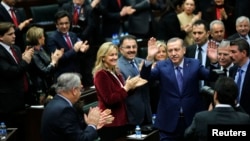ISTANBUL —
With the Turkish government mired in corruption allegations, it has found an unlikely ally. Leading members of the pro-Kurdish movement are backing Prime Minister Recep Tayyip Erdogan's claim that he is the victim of an international conspiracy. Such support is attributed to the belief that Erdogan is key to ongoing peace efforts with the Kurds.
For months, the Turkish government has been battling corruption allegations involving, among other things, money-laundering. Prime Minister Recep Tayyip Erdogan has cast the allegations as an attempted "judicial coup" - and blames foreign powers.
Turkey’s main pro-Kurdish Peace and Democracy Party, normally a critic of Erdogan, has been more reticent in criticizing the government. Earlier this month, BDP parliamentary deputy Sirri Sakik even played down the corruption allegations.
Sakik said he did not care very much about the corruption issue, adding "If the money is not stolen that way, it would be stolen in some other way."
Observers said the reason the pro-Kurdish party was backing away from criticism of Erdogan was that the BDP was anxious to preserve ongoing peace efforts between the Turkish government and the Kurdish population.
The ruling AK Party has initiated a peace process to bring an end to the decades-long conflict between the Kurdistan Workers Party, or PKK, and the Turkish state.
Political scientist Nuray Mert of Istanbul University said the pro-Kurdish movement could pay a high price for its pragmatic approach.
"The picture that they give is like they are just focused on their own struggle, rather than considering the whole picture of Turkey. It makes the Kurdish political party quite irrelevant in the eyes of ordinary Turks. You are accepting this indecent proposal by this corrupt government in exchange of your rights and freedoms," said Mert.
In January, the banned Group of Communities in Kurdistan, which is linked to the PKK, issued a statement supporting government claims that the corruption probes are part of an international conspiracy to overthrow the prime minister.
The statement blamed a conspiracy of London businesses, along with Jews, Greeks and Armenians.
The declaration drew heavy criticism including from leading members of the pro-Kurdish movement - a sign that there are limits to their belief in a conspiracy theory.
But there are even bigger problems that may compromise peace efforts.
Political scientist Mert said, with the government mired in crisis, she questioned whether it was even in a position to deliver on peace.
"This political government can stick to power for some time. But it's lost domestic and international legitimacy, so has ceased to be an actor who can solve the Kurdish problem," she said.
The government’s room to maneuver is likely to be further hampered when Turkey's 18-month election campaign starts next month. Observers point out that many members of the ruling AK Party voters are Turkish nationalists who are skeptical of ongoing Kurdish peace efforts. This is likely to make it difficult for the prime minister to make major concessions to Turkey’s Kurdish minority in the near future.
For months, the Turkish government has been battling corruption allegations involving, among other things, money-laundering. Prime Minister Recep Tayyip Erdogan has cast the allegations as an attempted "judicial coup" - and blames foreign powers.
Turkey’s main pro-Kurdish Peace and Democracy Party, normally a critic of Erdogan, has been more reticent in criticizing the government. Earlier this month, BDP parliamentary deputy Sirri Sakik even played down the corruption allegations.
Sakik said he did not care very much about the corruption issue, adding "If the money is not stolen that way, it would be stolen in some other way."
Observers said the reason the pro-Kurdish party was backing away from criticism of Erdogan was that the BDP was anxious to preserve ongoing peace efforts between the Turkish government and the Kurdish population.
The ruling AK Party has initiated a peace process to bring an end to the decades-long conflict between the Kurdistan Workers Party, or PKK, and the Turkish state.
Political scientist Nuray Mert of Istanbul University said the pro-Kurdish movement could pay a high price for its pragmatic approach.
"The picture that they give is like they are just focused on their own struggle, rather than considering the whole picture of Turkey. It makes the Kurdish political party quite irrelevant in the eyes of ordinary Turks. You are accepting this indecent proposal by this corrupt government in exchange of your rights and freedoms," said Mert.
In January, the banned Group of Communities in Kurdistan, which is linked to the PKK, issued a statement supporting government claims that the corruption probes are part of an international conspiracy to overthrow the prime minister.
The statement blamed a conspiracy of London businesses, along with Jews, Greeks and Armenians.
The declaration drew heavy criticism including from leading members of the pro-Kurdish movement - a sign that there are limits to their belief in a conspiracy theory.
But there are even bigger problems that may compromise peace efforts.
Political scientist Mert said, with the government mired in crisis, she questioned whether it was even in a position to deliver on peace.
"This political government can stick to power for some time. But it's lost domestic and international legitimacy, so has ceased to be an actor who can solve the Kurdish problem," she said.
The government’s room to maneuver is likely to be further hampered when Turkey's 18-month election campaign starts next month. Observers point out that many members of the ruling AK Party voters are Turkish nationalists who are skeptical of ongoing Kurdish peace efforts. This is likely to make it difficult for the prime minister to make major concessions to Turkey’s Kurdish minority in the near future.




